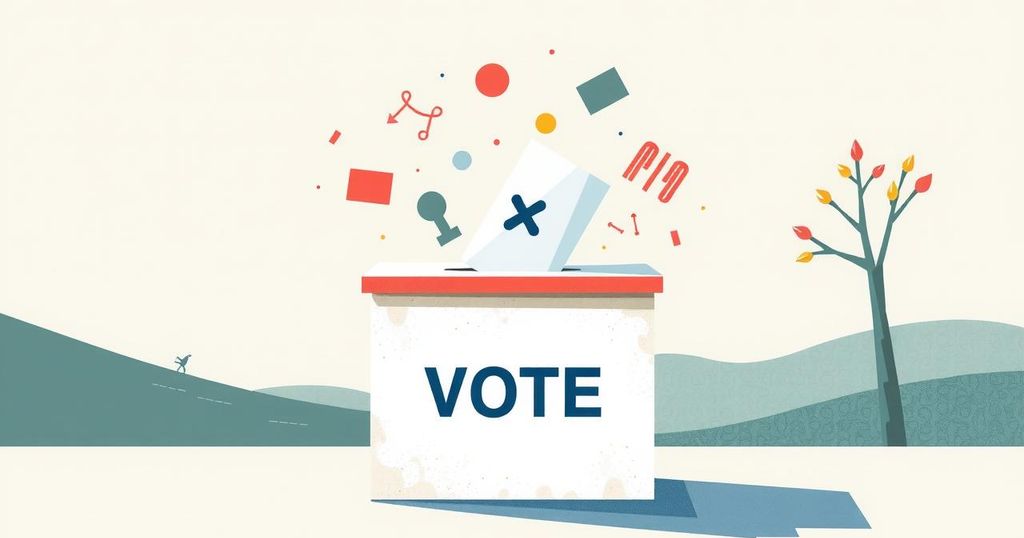Ecuador’s Presidential Election: A Pivotal Moment Amid Rising Crime Challenges

Ecuador’s upcoming presidential election on February 9, 2024, is crucial for President Daniel Noboa as he seeks a full term amid escalating crime and economic concerns. Facing 15 challengers, most notably Luisa Gonzalez, the election serves as a referendum on his brief administration. As voters prioritize crime and insecurity, the election will also impact the newly expanded National Assembly, shaping the country’s future policies.
President Daniel Noboa, elected at the age of 37, faces a critical election as he seeks a full four-year term in Ecuador amid rising crime and economic challenges. Since his previous victory was for the remainder of his predecessor’s term, this election not only tests his leadership but also serves as a referendum on his administration’s effectiveness in curbing violence and managing the economy.
Noboa confronts 15 candidates, including his main rival Luisa Gonzalez from the left-wing Citizen Revolution party, in a ballot scheduled for February 9, 2024. A candidate must achieve over 50 percent of the votes, or at least 40 percent with a 10-point lead, to win outright; otherwise, the top two will compete in a runoff on April 13.
The upcoming election is not limited to the presidency; it is a general election that includes all seats in Ecuador’s National Assembly, which will now expand its representation from 137 to 151 members. President Noboa’s current term has been cut short due to the unprecedented invocation of the “muerte cruzada”—a mechanism that dissolved the legislature amidst political turmoil.
Polls suggest a competitive landscape, with Noboa leading but likely heading for a runoff against Gonzalez, who he narrowly defeated in 2023. Historical polling often underestimates voter preferences, as seen when Noboa initially had low visibility before his first win; he must continuously engage voters to solidify his position.
Several notable candidates return, including Jan Topic, who advocates for strict anti-crime policies, and Leonidas Iza, president of the Indigenous CONAIE. Additionally, Andrea Gonzalez, who was formerly associated with a candidate assassinated in 2023, is also a contender. This diverse field reflects Ecuador’s ongoing struggle with violence and corruption.
As for legislative dynamics, both Noboa’s National Democratic Action party and Gonzalez’s Citizen Revolution party lead in early polls, with citizen support fluctuating significantly. In particular, the Election Day outcome will determine the balance of power within the National Assembly, which significantly influences legislative agendas.
Voter concerns center around crime and insecurity, now viewed as the predominant issues surpassing economic hardships and utility outages, as reflected in public sentiment. Ivan Briscoe, an expert on Latin American politics, emphasized the urgency of these concerns, adding that citizens prioritize a firm response to rising crime rates, which have skyrocketed in recent years.
Ecuador’s recent past is marked by noticeable spikes in violence, with a record-high murder rate prompting urgent governmental responses. Historically considered a safe haven, Ecuador’s transformation into one of the most violent nations stems from the influx and influence of drug-trafficking organizations leveraging geographical advantages. Experts note the intersection of economic distress and youth recruitment into criminal activities exacerbated this violence.
In light of escalating violence, voters seem inclined to endorse stringent security measures, demonstrated in April’s reforms favoring military involvement in public safety and intensified punitive measures against drug offenders. Noboa’s government has shown readiness to waive certain civil rights to maintain order, yet while some improvements have been seen, systemic issues necessitate a deeper multilateral approach that includes addressing socio-economic disparities and government accountability.
Ecuador’s political landscape is currently shaped by high crime rates and economic instability, leading voters to seek assertive leadership. President Daniel Noboa aims to establish a more robust term in office while confronting a multitude of presidential candidates. This election serves as a pivotal moment for evaluating his administration’s achievements and shortcomings, particularly in public security and crime management in the wake of unprecedented violence. The recent invocation of “muerte cruzada” signified a dramatic shift in Ecuadorian politics, resulting in Noboa assuming office under unusual circumstances and aiming to garner greater support to implement his policies effectively. As voters prioritize urgent crime-related issues, candidates must navigate a complex political environment to address both immediate public concerns and long-term institutional challenges. Given Ecuador’s geographical positioning and challenges due to drug trafficking, experts highlight the need for comprehensive solutions that transcend mere punitive measures. The election will play a significant role in shaping future policies regarding crime, governance, and civil rights, making it crucial for citizens to remain informed and engaged in the electoral process.
The upcoming presidential election in Ecuador marks a crucial juncture for President Daniel Noboa and the wider political landscape. As Noboa seeks a full term, issues like crime, economic challenges, and public safety dominate voter concerns. With a crowded field of candidates, including strong opposition figures, this election will serve as a critical referendum on Noboa’s leadership and the policies that have unfolded during his abbreviated term. Ultimately, the election results will determine not only the presidency but also the composition of the National Assembly, influencing Ecuador’s response to its pressing issues moving forward.
Original Source: www.aljazeera.com







